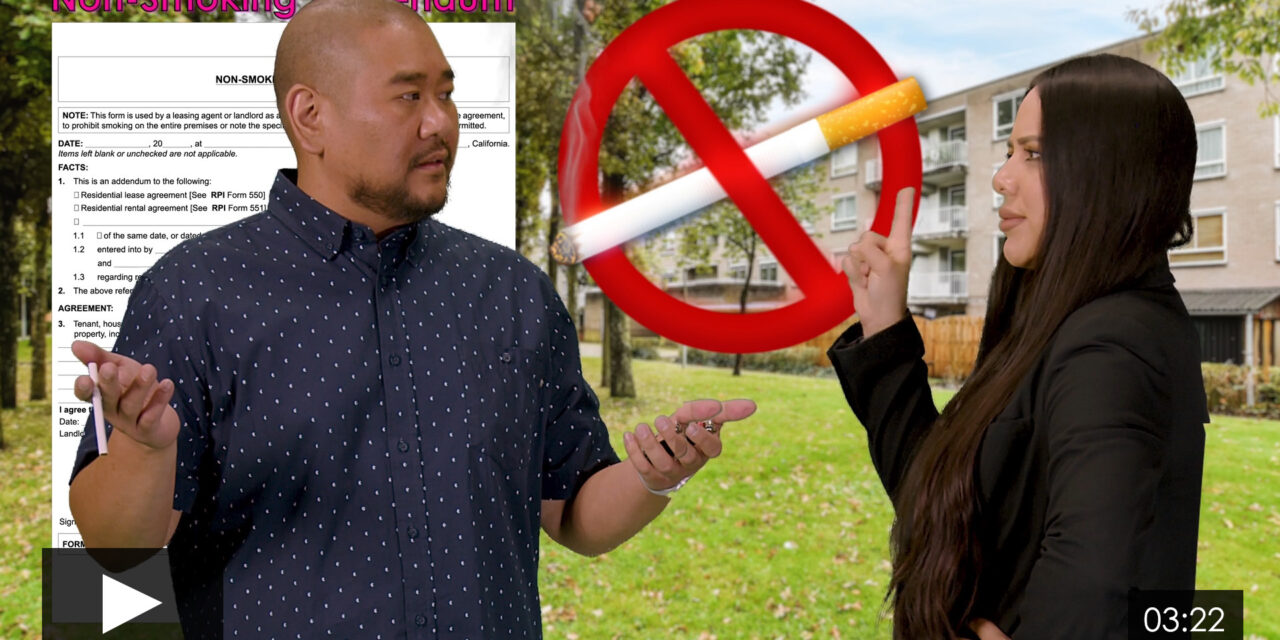This is the final episode in our new video series dramatizing the shared and different terms of occupancy under residential rental and lease agreements, and the controlling provisions.
The prior episodes covers the condition of premises and condition of furnishing addenda.
Beyond boilerplate
Any provisions agreed to but not included in the boilerplate provisions of pre-printed lease or rental agreements are included in an addendum to the rental or lease agreement. The additional or conflicting provisions are entered on the addendum. The addendum is then referenced in the body of the rental or lease agreement as attached. [See RPI Form 550-1]
One such addendum is the pet addendum. When a landlord allows pets, they often:
- impose restrictions on the type or size of the pet; and
- require the landlord’s written consent to keep the pet on the premises. [See RPI Form 551 §6.9 and Form 550 §6.9]
The landlord and tenant may sign and attach a pet addendum that states:
- the type of pet and its name;
- the security deposit to be charged for the pet (but limited as part of the maximum security deposit allowed); and
- the tenant’s agreement to hold the landlord harmless for any damage caused by the pet. [See RPI Form 563]
Note that a landlord may not prohibit a disabled person from keeping a specially trained guide dog on the premises. [Calif. Civil Code §54.1(b)(5)]
Additionally, a landlord who allows pets may not:
- favor declawed or devocalized animals in any advertisement;
- refuse to rent or negotiate for rent to a tenant because their pet has not been declawed or devocalized; or
- require tenants’ pets to be declawed or devocalized as a condition of renting the property. [CC §1942.7]
Editor’s note — Although landlords may not favor declawed or devocalized pets, they may still protect against property damage or noise by including a lease provision barring specific pet behavior or prohibiting pets altogether.
Non-smoking addendum
Every landlord has a duty to ensure the residential housing they rent is safe and sanitary throughout the tenant’s occupancy. Additionally, a landlord has a duty to protect their tenants from foreseeable dangers.
Since environmental tobacco smoke (ETS) poses a legislatively recognized danger to tenants, a wise landlord takes steps to avoid claims. [Stoiber v. Honeychuck (1980) 101 CA3d 903; Calif. Code of Civil Procedure §1174.2]
A landlord may do any of the following risk avoidance activities to alleviate the burden of future ETS disputes:
- relocate smokers so they will not affect non-smokers;
- relocate non-smokers so they are not affected by the ETS of smoking tenants; or
- refuse to rent to persons who will not agree to the non-smoking provisions made a part of the rental or lease agreement.
Alternatively, the landlord may:
- designate all of the property as smoke-free, with the exception of any clearly defined areas where smoking will not affect others, by amending existing rental agreements or expired lease agreements; [See RPI Form 563-1] and
- enforce no smoking as part of the rules and policies of occupancy of the property through a “property policies” provision in the rental or lease agreement, then serve tenants who breach the no-smoking rule with a three-day notice perform (do not smoke) or quit (vacate). [See RPI Form 550 §6.12; see RPI Form 576-1]
The above policies may be agreed upon by the landlord and tenant by the use of a Non-Smoking Addendum when entering into a rental or lease agreement. The Non-Smoking Addendum either prohibits smoking on the entire premises, or notes the specific location on the property where smoking is permitted. [See RPI Form 563-1 §3]
A non-smoking policy may not be imposed on tenants under an existing fixed-term lease until renewal of the lease is negotiated, at which point the addendum may be attached. However, the use of a property policies provision in a lease agreement is a method for changing the rules on tenants during the term of a fixed-term lease.
However, tenants occupying under a month-to-month (periodic) rental agreement or an expired lease agreement may be given a 30-day Notice of Change in Rental Terms containing the non-smoking provision as the change. [See RPI Form 570 §7]
The tenant receiving a 30-day Notice of Change in Rental Terms does not need to sign a non-smoking addendum. The tenant, by remaining in possession and not giving notice to vacate, has by remaining silent agreed to the non-smoking provision. The non-smoking condition is enforceable on the running of 30 days from delivery of the notice.
Waterbed addendum
Lease agreements and month-to-month rental agreements also prohibit a tenant from keeping a waterbed or other liquid-filled furnishings on the premises without the landlord’s written consent. [See RPI Form 551 §6.9 and Form 550 §6.9]
When a tenant has a waterbed, the landlord may require the tenant to sign a waterbed addendum. [See RPI Form 564]
The waterbed addendum indicates:
- the additional security deposit the tenant will be required to provide for keeping a waterbed on the premises (in addition to the maximum security deposit allowed); and
- the tenant’s agreement to maintain an insurance policy to cover potential property damage when the waterbed leaks or bursts.
Other addenda
Other addenda which may be incorporated into a residential rental or lease agreement include:
- house or building rules; and
- any rent control disclosures required by local rent control ordinances.
A residential landlord seeking to sell a property may also grant the tenant an option to purchase the property. [See RPI Form 161]
However, no portion of any option money or the rent may be applied to the purchase price. When the terms of the lease agreement or option agreement provide for any credit to be applied toward the purchase price, or to a down payment on the purchase price, the tenant has acquired an equitable ownership interest in the property and cannot be evicted.
This is called a lease-option sale, and is a masked sale of the property typically entered into in violation of all the single family residence (SFR) disclosures to the buyer/tenant, mortgage lender and county assessor. The lease-option sale also lacks the protective formalities and fees involved in an escrowed grant deed transfer of ownership.



















